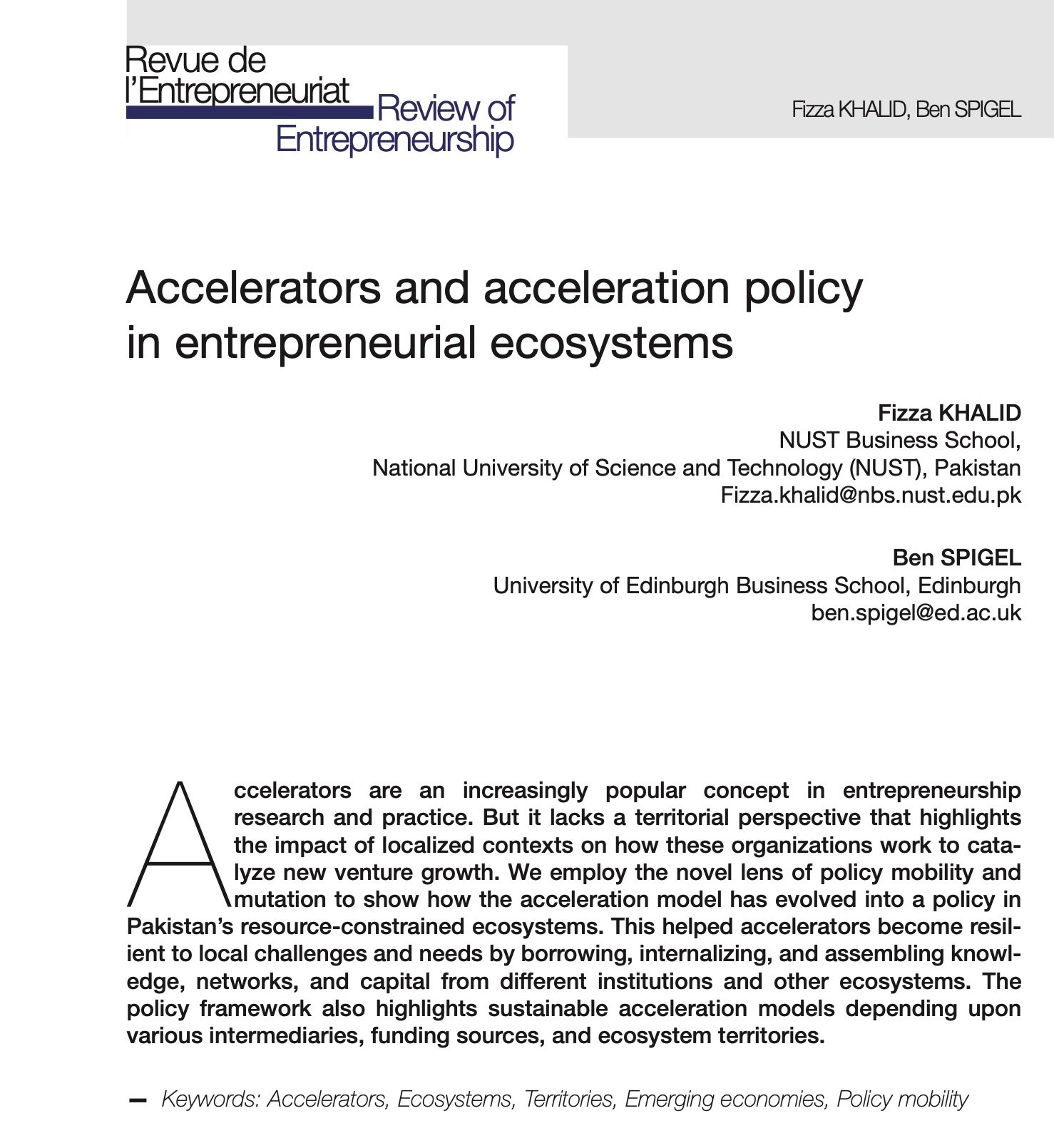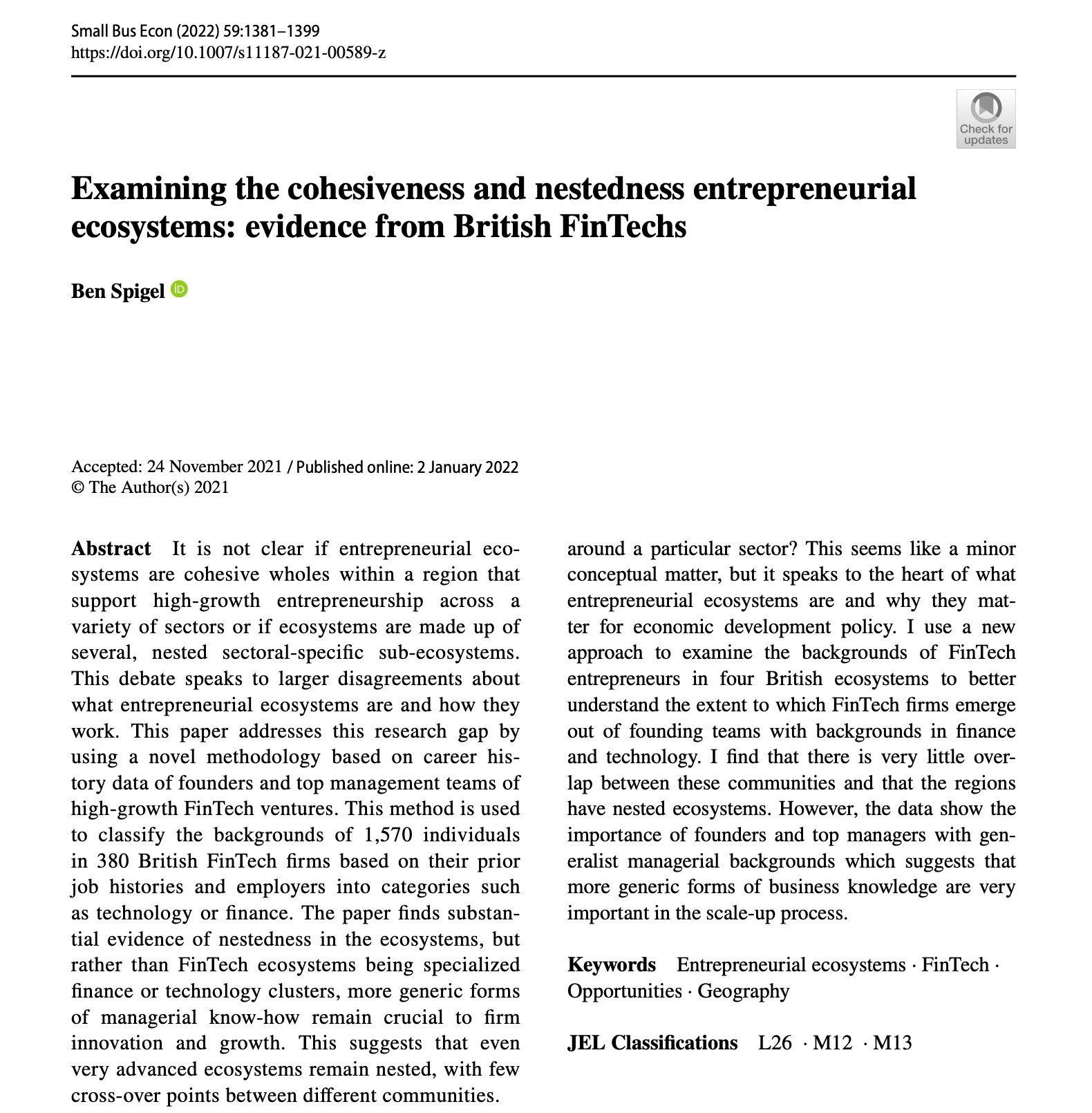Toward an Entrepreneurial Ecosystem Research Program
Wurth, Stam and Spigel (2022). Entrepreneurship Theory and Practice (2022) 46(3) p. 729-788
Entrepreneurial ecosystems have become a prominent concept, yet in its current state, the concept itself represents a paradox. While it draws on a rich intellectual history and provides an opportunity to synthesize different strands of research, it is also under-theorized and the mechanisms that govern ecosystem evolution are not well understood. This paper takes stock of recent advancements in ecosystem scholarship and synthesizes the empirical reality of the causal mechanisms. We use these dynamics to position ecosystems in a broader context, within and beyond the domain of entrepreneurship research, and propose a transdisciplinary research program for ecosystem research and practice.
This study explores how high-growth entrepreneurs use well-being and emotional labour as tools to respond to crises. Drawing on 173 longitudinal interviews with 57 high-growth entrepreneurs during the Covid-19 crisis, we explore internal crisis response strategies. The data show that entrepreneurs employ a variety of emotional labour practices which produce organizational resilience. However, these practices are in tension with the strategic practices required for economic resilience. We show how the emotional of entrepreneurs serves as part of their crisis leadership strategy. This adds a new perspective to the literature on entrepreneurial crisis and resilience by showing the complexity of internal reactions to sudden and prolonged shocks.
Accelerators, acceleration, and policy mobility in entrepreneurial ecosystems.
F. Khalid and B. Spigel (2023). Review of Entrepreneurship / Revue de l’Entrepreneuriat 2(2):47-74.
Accelerators are an increasingly popular concept in entrepreneurship research and practice. But it lacks a territorial perspective that highlights the impact of localized contexts on how these organizations work to catalyze new venture growth. We employ the novel lens of policy mobility and mutation to show how the acceleration model has evolved into a policy in Pakistan’s resource-constrained ecosystems. This helped accelerators become resilient to local challenges and needs by borrowing, internalizing, and assembling knowledge, networks, and capital from different institutions and other ecosystems. The policy framework also highlights sustainable acceleration models depending upon various intermediaries, funding sources, and ecosystem territories.
Trans-Contextual Work: Doing Entrepreneurial Contexts in the Periphery.
P. Muñoz, J. Kimmitt, and B. Spigel (2023). Small Business Economics.
This study explores how entrepreneurs “do” contexts in peripheral areas. Through the examination of changes in roles, practices, and relationships across peripheral areas in Chile, we found that substantive transformations result from the momentary repurposing of systems of provision, types of inter-dependencies, and sources of reliance within public, community, and family contexts. Drawing from the perspective of interstitial spaces and extensive data, this is done through three interwoven interaction rituals: support seeking, neighboring, and nesting. We abductively theorize the connection between these rituals as trans-contextual work. As entrepreneurs do contexts through trans-contextual work new entrepreneurial ideas, practices and artifacts begin to reorganize community resources and transform the commune’s social into an entrepreneurial life. Our research expands the current understanding of contextual change in peripheral areas and contextualization in entrepreneurship more broadly.
B. Spigel (2022). Small Business Economics.
It is not clear if entrepreneurial ecosystems are cohesive wholes within a region that support high-growth entrepreneurship across a variety of sectors or if ecosystems are made up of several, nested sectoral-specific sub-ecosystems. This debate speaks to larger disagreements about what entrepreneurial ecosystems are and how they work. This paper addresses this research gap by using a novel methodology based on career history data of founders and top management teams of high-growth FinTech ventures. This method is used to classify the backgrounds of 1,570 individuals in 380 British FinTech firms based on their prior job histories and employers into categories such as technology or finance. The paper finds substantial evidence of nestedness in the ecosystems, but rather than FinTech ecosystems being specialized finance or technology clusters, more generic forms of managerial know-how remain crucial to firm innovation and growth. This suggests that even very advanced ecosystems remain nested, with few cross-over points between different communities.
Towards an entrepreneurial ecosystem research program.
B. Wurth, E. Stam, and B. Spigel (2022). Entrepreneurship Theory and Practice 46(3):729-778
Entrepreneurial ecosystems have become a prominent concept, yet in its current state, the concept itself represents a paradox. While it draws on a rich intellectual history and provides an opportunity to synthesize different strands of research, it is also under-theorized and the mechanisms that govern ecosystem evolution are not well understood. This paper takes stock of recent advancements in ecosystem scholarship and synthesizes the empirical reality of the causal mechanisms. We use these dynamics to position ecosystems in a broader context, within and beyond the domain of entrepreneurship research, and propose a transdisciplinary research program for ecosystem research and practice.
Meeting its Waterloo? Recycling in Entrepreneurial Ecosystems after Anchor Firm Collapse.
B. Spigel and T. Vinodrai. (2021). Entrepreneurship & Regional Development 33(7-8): 599-620
Received 2019 Academy of Management Entrepreneurship Division Award for Best Empirical Paper
The ‘recycling’ of people, capital, and ideas within an entrepreneurial ecosystem is a key process driving high-growth entrepreneurship. Skilled workers who leave firms after successful exits or firm collapse bring knowledge and insights that they can use to start new ventures or work at existing scale-up firms. This makes large anchor firms important actors in attracting workers who may subsequently recycle into the local ecosystem. However, there is limited empirical research on recycling into an ecosystem after the loss of an anchor firm. This paper develops a novel methodology using career history data to track recycling into ecosystems. The paper develops a study of Waterloo, Ontario, home to the smartphone manufacturer Blackberry, whose decline in 2008 represented a significant shock to the local entrepreneurial ecosystem. We find that alumni of this firm engaged in very little high-growth entrepreneurship, instead entering the ecosystem as technology employees at high-growth scale-up firms. This was aided by the region's increased institutional capacity to match skilled workers with new ventures, ensuring the continued success of the ecosystem over time. These findings provide a more nuanced understanding of the role of anchor firms in entrepreneurial ecosystems and how recycling affects the dynamics of entrepreneurial ecosystems.
Entrepreneurial Ecosystems: Theory, Practice, and Futures.
B. Spigel. (2020). Edward Elgar.
This is a guide to understanding entrepreneurial ecosystems: what they are, why they matter, and to whom they matter. Ben Spigel explores this popular new theory of economic development, locating the intellectual roots of ecosystems, explaining the practices and processes that allow ecosystems to support the creation and growth of innovative entrepreneurial firms.
Investigating why some places are able to support innovative, high-growth entrepreneurship while others cannot, this book looks at the characteristics of entrepreneurial places in both developed and developing countries to identify the role of factors such as culture, social networks and economic history. Going beyond just the different combinations of different people and factors of a place, Spigel explores the social and economic processes such as learning and entrepreneurial recycling that power how ecosystems develop and influence high-growth venture creation.
Entrepreneurship and economic geography scholars will appreciate the strong theoretical exploration of this new approach to understanding entrepreneurship. It will also be a helpful read for public officials, policy makers, and ecosystems builders looking to delve further into this prominent new concept in local economic development policy.







